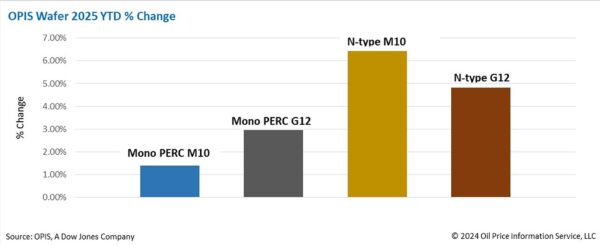FOB China prices for Mono PERC wafers remained steady this week, with Mono PERC M10 and G12 wafers priced at $0.144 per pc and $0.208/pc, respectively. Meanwhile, FOB China prices for n-type M10 and G12 wafers experienced slight increases, reaching $0.149/pc and $0.196/pc, respectively, reflecting a growth of 2.05% and 1.55% compared to the previous week.

Since the start of 2025, n-type wafer prices have risen for three consecutive weeks, driven by production cuts and lower inventory levels. Large-scale production cuts by wafer companies since Q3 2024 have effectively reduced market inventory to about two weeks of production, significantly lower than the inventory levels of polysilicon and modules.
These developments have led wafer companies to raise their operating rates since early January, with the overall average now exceeding 50%. As a result, January wafer output is expected to reach approximately 46 GW, up 5.5% from 43.61 GW in October 2024.
The sustainability of the wafer price increase depends on a potential rebound in solar cell transaction prices, industry participants note. They also caution that wafer operating rates in the coming weeks will be critical. A significant rise in operating rates driven by higher prices could risk price drops after the Chinese New Year, as the current vast production capacity may quickly drive inventory levels back to high levels.
Another recent trend in the Chinese market is the sluggish sales of rectangular G12R (182 mm x 210 mm) wafers, which have driven prices downward. Sources attribute this to the rapid production ramp-up of this size across both upstream and downstream segments, surpassing its adoption by end users. Consequently, an oversupply of this specification has developed before it could gain traction as a mainstream product.
Last week, the U.S. Department of Homeland Security expanded its ban list of China-based entities, adding four ingot and wafer manufacturers, including a subsidiary of a prominent solar integrated manufacturer. The action was taken on the grounds that these entities were found to source polysilicon from regions in China that do not comply with traceability requirements.
Insiders widely believe that this U.S. decision will theoretically support increased demand for global polysilicon, though its impact has not yet been fully realized. It is also expected to further hinder the export of Chinese wafers and the modules derived from these wafer suppliers to the U.S. With these manufacturers excluded from the U.S. export market, reduced competition may stabilize or even increase wafer and module prices in the U.S. This move aligns with prior market expectations and reflects the U.S.’ strategic intent to implement energy-related policies aimed at minimizing reliance on components associated with China.
The U.S. Department of the Treasury updated safe harbor tables this week, introducing new default component cost percentages to account for the premium customers will pay for U.S.-made wafers, aiming to incentivize domestic wafer manufacturing. The bonus is seen as a “direct complement” to the 45X Advanced Manufacturing Production Tax Credit. While the inclusion of wafers in the guidance is considered significant, industry players remain skeptical about its impact on procurement activities or wafer manufacturing plans in the U.S.
OPIS, a Dow Jones company, provides energy prices, news, data, and analysis on gasoline, diesel, jet fuel, LPG/NGL, coal, metals, and chemicals, as well as renewable fuels and environmental commodities. It acquired pricing data assets from Singapore Solar Exchange in 2022 and now publishes the OPIS APAC Solar Weekly Report.
The views and opinions expressed in this article are the author’s own, and do not necessarily reflect those held by pv magazine.
This content is protected by copyright and may not be reused. If you want to cooperate with us and would like to reuse some of our content, please contact: editors@pv-magazine.com.








By submitting this form you agree to pv magazine using your data for the purposes of publishing your comment.
Your personal data will only be disclosed or otherwise transmitted to third parties for the purposes of spam filtering or if this is necessary for technical maintenance of the website. Any other transfer to third parties will not take place unless this is justified on the basis of applicable data protection regulations or if pv magazine is legally obliged to do so.
You may revoke this consent at any time with effect for the future, in which case your personal data will be deleted immediately. Otherwise, your data will be deleted if pv magazine has processed your request or the purpose of data storage is fulfilled.
Further information on data privacy can be found in our Data Protection Policy.